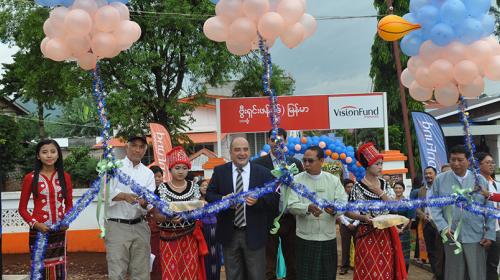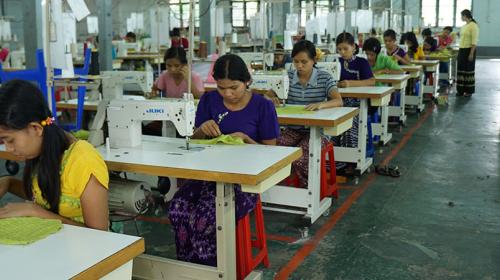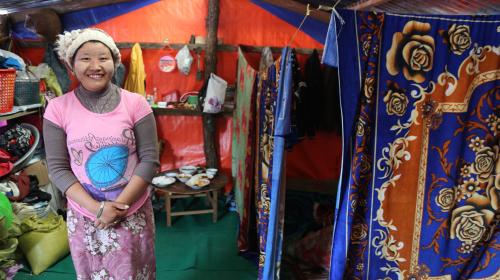
LIFT strives to be a collective and influential voice for innovation and learning that can inform development policy and practice in Myanmar. When implementation of the 2014-2018 strategy began, LIFT developed a monitoring and evaluation for accountability and learning (MEAL) framework that included a set of high-level evaluation and learning questions that LIFT would address. These questions cover key aspects of LIFT’s performance: relevance, effectiveness, sustainability, and women’s empowerment. They are intended to assess LIFT’s performance and serve as tools to synthesise LIFT’s learning in relation to the key evaluation criteria.
The second evaluation and learning question on programme effectiveness is: To what extent has LIFT contributed to strengthening the resilience of poor people in Myanmar and helped them to hang in, step up or step out? LIFT commissioned a series of three in-depth outcome studies, focusing on LIFT’s contribution to each of the first three purpose-level outcomes: income, vulnerability and nutrition. These studies draw primarily on LIFT Household Survey data from 2015 and 2017, complemented with qualitative data gathered from individuals in target communities and from LIFT’s implementing partners. The findings from these three studies were synthesised into a resilience study that drew together the main findings from the individual studies, with a particular emphasis on LIFT’s contribution to building resilience in the face of household exposure to shocks and stresses.
The series includes a total of five studies:>

Increasing Income and Assets in LIFT-Supported Villages 2014-2018: This study explores the linkages between LIFT’s Theory of Change, assistance received by households, and changes in households’ income levels and consumption expenditure, asset ownership, poverty levels, access to financial services and debt levels, and the effect of shocks and stresses on income. It uses the quantitative panel data of 2,249 households from LIFT’s 2015 and 2017 Household Surveys and employs a fixed effects regression analysis and a matched differences-in-differences approach, integrating findings from a large-scale qualitative study. https://www.lift-fund.org/increasing-income-and-assets-lift-supported-villages-2014-2018

Decreasing Vulnerabilities in LIFT-Supported Villages 2014-2018: This study explores changes in vulnerability and resilience levels in LIFT-supported villages, as well as the effects of shocks and stresses, and their relationship with households receiving development assistance. The study uses the panel data of 2,249 households from LIFT’s 2015 and 2017 Household Surveys, as well as over 150 narrative interviews conducted in 2016 and 2018. A multi-dimensional vulnerability index is applied. https://www.lift-fund.org/decreasing-vulnerabilities-lift-supported-villages-2014-2018

Nutrition and Resilience in Myanmar: A Review of Evidence (Nutrition Part 1): This study reviews the existing literature on nutrition and resilience and develops a conceptual framework for the relationship between nutrition, food security and resilience in Myanmar. By presenting the evidence on the current situation in Myanmar, it demonstrates why it is important to address undernutrition and resilience-building concurrently and proposes recommendations for doing so. Will be made available soon.

Nutrition and Resilience in Myanmar: Improving the Nutritional Status of Women and Children in LIFT-Supported Villages 2014-2018 (Nutrition Part 2): This study presents an in-depth analysis of LIFT 2015 and 2017 Nutrition Survey data through a nutrition-resilience lens. It first provides an overview of LIFT’s nutrition-related programmes and then measures nutrition-related changes at the village level, the household level, and individual level, including stunting and wasting rates of children and underweight measurements and dietary diversity of mothers. It also explores the drivers of child stunting and wasting and women’s nutrition, as well as the effects of shocks and stresses on nutrition outcomes. Will be made available soon.

Strengthening Resilience in LIFT-Supported Villages 2014-2018: A Synthesis Paper: This paper synthesises the major findings from the Income and Assets, Vulnerability, and Nutrition outcome studies to explore LIFT’s overall contributions to strengthening resilience in Myanmar. The first section presents an overview of key trends in LIFT villages from 2015 to 2017, highlighting changes to the social-political context and rural livelihoods since 2015. It then describes LIFT interventions and examines progress towards LIFT’s purpose and programme-level outcomes. The third section includes a discussion on resilience, how different households have fared in the face of shocks and stresses, and what coping strategies and forms of assistance have been effective. The paper concludes with key recommendations for LIFT and development partners seeking to build resilience in the Myanmar context.https://www.lift-fund.org/strengthening-resilience-lift-supported-villages-2014-2018a-synthesis-paper
In addition to these studies focused on LIFT’s ‘effectiveness’ evaluation and learning questions, LIFT commissioned additional studies focusing on assessing the implementation of LIFT’s Gender Strategy and evaluating LIFT’s performance in terms of the relevance and sustainability of its projects.

Gender Strategy Evaluative Study of LIFT 2014-2018: This study answers the question “To what extent has LIFT contributed to furthering gender equality and women’s empowerment?” It assesses the degree to which LIFT’s gender strategies’ objectives have been achieved and identifies effective ways for LIFT to further gender equality and women’s empowerment in the future. The study covers all LIFT’s thematic and geographic areas, with in-depth analysis of LIFT and implementing partners’ work in nutrition, financial inclusion, migration, social protection and inclusive value chains. Across these areas, the recommendations include conducting gender analysis and identifying barriers to participation of excluded individuals and households to make project design responsive and inclusive; and ensuring that men and other non-traditional target groups are included in interventions to address gender relations and women’s empowerment. Unpaid care work and triple roles of women (productive, reproductive and community) need to be addressed, to recognise, reduce and redistribute work across all programming. Women’s leadership can be supported and developed by creating specific opportunities for emerging women leaders to take on roles across various levels and platforms. https://www.lift-fund.org/gender-strategy-evaluative-study-lift-2014-2018

Relevance and Sustainability of LIFT Projects 2014-2018:This study aims to answer two of LIFT’s Evaluation and Learning Questions covering relevance: “to what extent have the LIFT strategy and LIFT interventions been relevant to the needs of the people it intends to reach?” and sustainability: “to what extent has LIFT identified and established socially, environmentally, and economically sustainable approaches for achieving the purpose and programme outcomes?” The study made use of standardised tools to assess project relevance and sustainability and identifies the key drivers of relevance and sustainability across a sample of 50 LIFT projects implemented between 2015 and 2018 . The study finds that while LIFT projects tend to perform very well in terms of relevance, achieving sustainability appears more challenging. The study identifies three key factors across different thematic areas that influence project sustainability: the level of complicatedness of the project, the extent to which the project provided direct support compared to more collaborative “facilitation”, and the extent to which projects had thought about and integrated sustainability into their project design and (adaptive) management. https://www.lift-fund.org/relevance-and-sustainability-lift-projects-2014-2018
A summary presentation of all the Evaluation and Learning Question Studies is available here: https://www.lift-fund.org/lift%E2%80%99s-2015-2019-evaluation-and-learning-questions.





